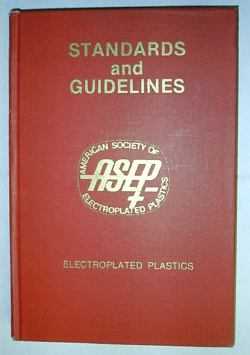
-----
Plateability of Polyurethane plastics?
Q. Hello all, I am writing in with a question about the plateability of Polyurethane plastic. We have gone round and round with some particular parts and sometimes we get good results and sometimes we don't. The surface has to be zero defect and the parts must be kept within specific weight parameters. Is there anybody that has a high degree of success simply with adhesion on this material, better yet high quality surface finishing on parts that have areas of very low current density? I have heard some whispers that it is possible but I just cannot see how. Any input would be greatly appreciated. EM
Erik Mac Kenna- Houston, Texas
2002
A. Hi, Erik. You probably realize this but, for the benefit of the readers, virtually anything can be electroplated -- but the usual issue is how to get sufficient adhesion to the substrate that the part can be successfully used for its intended purpose.
by American Society for Electroplated Plastics

on eBay or Amazon
or AbeBooks
(affil link)
Most plating on plastic is done on ABS because this material involves two components, one of which readily etches away, affording an outstanding "key" or mechanical bond. The adhesion is so good that exterior automotive parts like grills are usually chrome plated ABS. Polyurethane doesn't offer this capability, so you would need some way to disturb the surface to provide a good mechanical "key". Perhaps this can be done with abrasive blasting, but I don't personally have experience with that. Good luck!
"Standards and Guidelines for Electroplated Plastic" is an outstanding text on this subject, but is out of print and hard to find. If you can find a copy it can probably be helpful..
Regards,

Ted Mooney, P.E.
Striving to live Aloha
finishing.com - Pine Beach, New Jersey
Ted is available for instant help
or longer-term assistance.
Q, A, or Comment on THIS thread -or- Start a NEW Thread